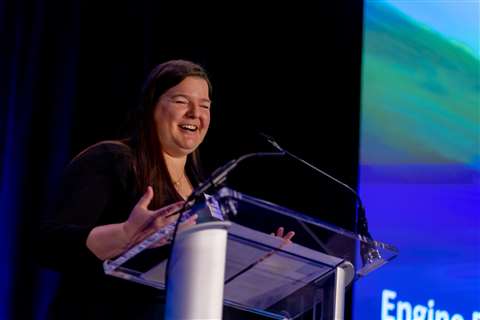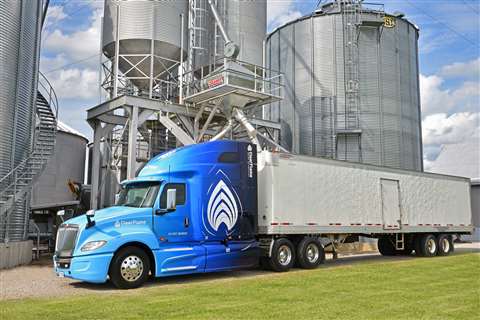ClearFlame seeks to disrupt the “heart” of heavy-duty applications
06 October 2022
 Dr. Julie Blumreiter, ClearFlame co-founder and chief technology officer, speaking to attendees of the fourth annual Diesel Progress Summit in Rosemont, Ill. (Photo: KHL/Joe Mather)
Dr. Julie Blumreiter, ClearFlame co-founder and chief technology officer, speaking to attendees of the fourth annual Diesel Progress Summit in Rosemont, Ill. (Photo: KHL/Joe Mather)
“ClearFlame’s mission is to disrupt diesel as the ‘beating heart’ of heavy-duty applications,” said Dr. Julie Blumreiter, the company’s co-founder and chief technology officer, in her presentation to attendees of the fourth annual Diesel Progress Summit in Rosemont, Ill.
But when she says “diesel,” she doesn’t mean the engine; rather, the target is the fuel and the engine’s dependence on it.
“We want to transform diesel engines into engines that can be used in a decarbonized future, but that are no longer reliant on diesel fuel,” she explained.
ClearFlame Engine Technologies offers proprietary technology designed to achieve this goal through component-level changes, while maintaining the underlying engine design and performance characteristics. “By tapping into that same form factor, same powertrain, we will be able to transform the industry with minimal disruption and in a way that is a little bit more cost effective,” Blumreiter stated.
Overcoming alternative fuel challenges
Blumreiter noted ignition challenges associated with alternative fuels that often require increasing the degree of pre-mixing of the air and fuel prior to combustion. The ClearFlame approach bypasses the pre-mixing strategy by capturing the engine’s existing thermal energy and “moving it around in a slightly different way.”
The technology obtains the heat from the engine itself by removing the cooler from the exhaust gas recirculation (EGR) circuit and adding a bypass on the aftercooler to use the already-hot air from the turbocharger compressor to enable auto ignition.
“We’re able to do that and still use high-pressure direct injection and that same mixing control process,” said Blumreiter. “There isn’t a spark plug, there isn’t a glow plug. We’re not changing the compression ratio or doing anything with fuel additives or using a diesel pilot to light off. It really is just the pure low-cetane fuel getting injected into a higher temperature environment and getting that fuel behavior that we desire.”
Accelerating decarbonization
The ClearFlame technology is initially available as a retrofit kit for on-road applications, with plans to work with OEMs in the off-highway market to introduce the technology as a product option. It is also currently focused on liquid alcohol fuels (e.g., ethanol) due to a variety of factors.
 ClearFlame’s decarbonization technology is designed to enable a diesel engine to operate on other low-carbon fuels, including ethanol. (Photo: Clearflame)
ClearFlame’s decarbonization technology is designed to enable a diesel engine to operate on other low-carbon fuels, including ethanol. (Photo: Clearflame)
“We think the liquid alcohol fuels offer tremendous potential because of their combination of those factors of cost, scale, decarbonization potential, etc. They’re also liquids under ambient conditions, which makes them easy to transport, easy for refueling,” Blumreiter said. “It’s all very familiar to the customer in terms of the way they already interact with their equipment and the way they already handle refueling logistics. There’s also some additional benefits of how these fuels burned very cleanly.”
Blumreiter believes the combination of ClearFlame’s readily adaptable technology with sustainable fuel sources can help accelerate the overall vehicle and equipment decarbonization process. “The sooner that we can get vehicles out there… the better we can create a complementary effect between the progress of electrification, progress of alternative fuels, and get to our end goal faster for having taken a multi-pronged approach,” she said. “Making engines that are adaptable to a range of fuels and duty cycles can also help to future proof your path going forward.
“We’re breaking the bond between the diesel engine and the fuel at Clearflame – but we’re also breaking down the barriers of what’s possible in this industry.”
STAY CONNECTED




Receive the information you need when you need it through our world-leading magazines, newsletters and daily briefings.
POWER SOURCING GUIDE
The trusted reference and buyer’s guide for 83 years
The original “desktop search engine,” guiding nearly 10,000 users in more than 90 countries it is the primary reference for specifications and details on all the components that go into engine systems.
Visit Now
CONNECT WITH THE TEAM










